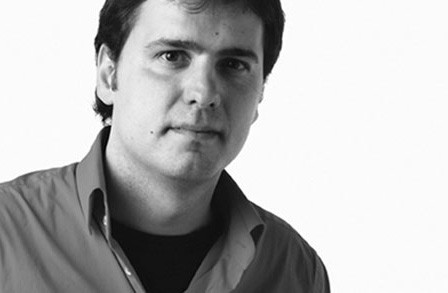"(Writing in a) small language, (living a) slow life."
Kirmen Uribe

Kirmen Uribe (Ondarroa, 1970) is, according to critics, one of the most relevant writers of his generation in Spain. His first collection of poetry, Bitartean heldu eskutik (2001), won Spain’s Premio de la Critica. Uribe’s imagery is rooted in his Basque homeland, with themes ranging from romantic love to technology, history to travel. A reviewer for the Los Angeles Times Book Review praised the translation, noting, “The poems are each a beacon of light and memory, surrounded by conflict, explosion and interruption.”
His novel Bilbao-New York-Bilbao earned him, at 39, the biggest and most prestigious literary distinction for a Spanish author, the National Prize of Literature, confirming him as one of the most interesting and original novelists in Basque and in Spain. The novel has been translated into over a dozen languages, including French (Gallimard), Japanese (Hakusui Sha) and English (Seren Books). It was selected by Foyles as one of the 15 books of the year in the UK in 2014.
His poetry collection Meanwhile Take My Hand (Graywolf, 2007) was a finalist for the 2008 PEN Award for Poetry in Translation. His second novel, Mussche/What Makes the World Go Around, written during a residency in Sausalito (CA), has been translated into Chinese and Japanese. His latest novel, La hora de despertarnos juntos (The Hour of Waking Together) has been recently published by Seix Barral (Planeta).
In addition to his poetry, Uribe has published essays, fiction, comics, and children’s literature. He has worked as a translator, scriptwriter, instructor, and columnist for the Basque-language daily newspaper Berria. His piece for theater, Ekidazu, has been produced by the groups Kukubiltxo and Oskorri. Uribe collaborated with poet-translator Elizabeth Macklin, singer-songwriter Mikel Urdangarin, and musicians Bingen Mendizabal and Rafa Rueda on a multimedia project integrating poetry, prose, video, music, and oral history, which was documented in the CD-books Bar Puerto (2001) and Zaharregia, txikiegia agian (2003). His works have been published at several American publications as The New Yorker, Open City, Circumference or Little Star. He has a column at El País Semanal. He writes in Basque.
The Massie Lecture is funded by Felice Massie and supported by the Department of Romance Languages and Literatures
- and piles them on the driveway: femur, rib, jawbone with a fewflat teeth attached, dozens of thin arced parts. This one for me—40today. My birthday sent her to the woods and back. Chloe leansin on her knees, arranges the bones...
